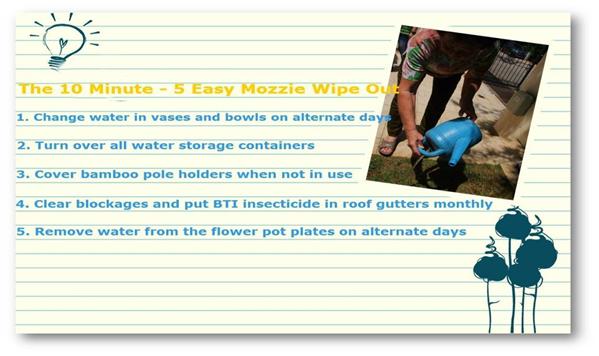It’s time for a biology lesson and in line with our nationwide mozzie alert, here are 7 things you should know about the aedes mosquito:
1. Aedes mosquitoes are identified by the black and white stripes on their body. Sort of like a zebra, but much, much smaller. And way less cute.
2. Only the female aedes mosquito bites people while the males just sit around and eat fruit. I hate to say this but females are usually way more badass.
3. They can breed in pools of water as small as a 20-cent coin. Like I said, badass.
4. The eggs can lie dormant in dry conditions for up to about nine months, after which they can hatch if exposed to favourable conditions, i.e. water and food. If I haven’t made their badassery clear enough, this should drive home the point because even their unhatched babies are badass.
5. The mosquito can lay eggs about three times in its lifetime, and about 100 eggs are produced each time. I guess if I had to deal with 300 babies, I’d go around biting people too. I have 3 babies and I already feel like biting people from time to time, just saying.
6. They like to lay their eggs in clean, stagnant water. Apparently mozzies can have OCD too.
7. Peak biting is at dawn and dusk. It’s their form of stealth attack, be warned.
Ok, there’s a point to these nuggets of information, which is to help you guys in your quest to exterminate them. I suppose if you’re the badass sort, one way is to arm yourself with those electric mozzie zappers to electrocute those little bloodsuckers if you see them around but it’s like having to fight zombies when they’re already fully grown and shuffling their way towards you with their jaws open.
A far more effective way would be to wipe out the babies before they get to the bitey stage. Or better yet, don’t even give them a chance to make babies.
Which is why we’re all doing the 5-step Mozzie Wipeout to eliminate stagnant pools of water in our homes, even those as small as a 20-cent coin.

To wrap up, these are some of the common areas that aedes mosquitoes love to breed:
- Ornamental containers
- Domestic containers
- Refrigerator trays
- Flower pot plates/trays
- Toilet bowls/cisterns
- Hardened soil in plants
- Gully traps
All it takes is a little vigilance from all of us so let’s all do what we can to stop the spread of dengue. For more information, check out the the website here. Or go like the Stop Dengue Now Facebook page and follow @NEAsg on twitter for live updates.


No Comments